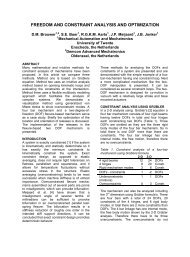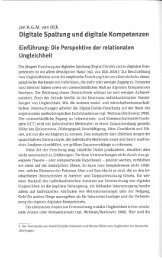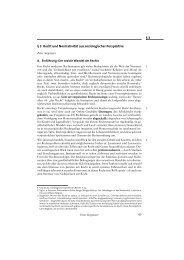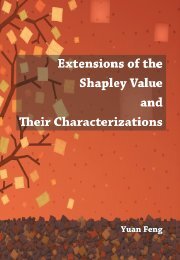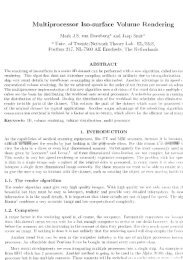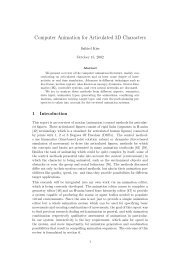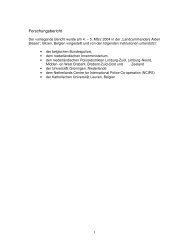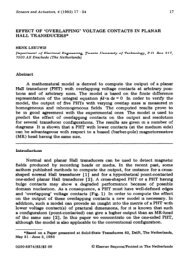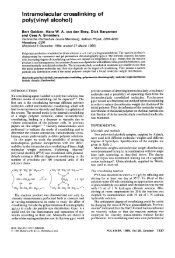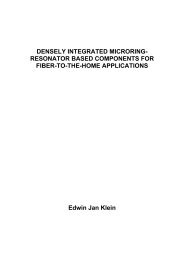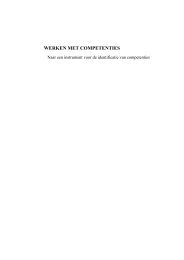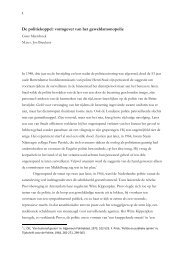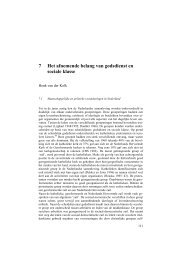Innovation and institutional change: the transition to a sustainable ...
Innovation and institutional change: the transition to a sustainable ...
Innovation and institutional change: the transition to a sustainable ...
Create successful ePaper yourself
Turn your PDF publications into a flip-book with our unique Google optimized e-Paper software.
Theoretical perspectives 29<br />
<strong>and</strong> user preferences that have become mutually attuned. Weak <strong>and</strong> strong<br />
linkages occur between <strong>the</strong> different elements, <strong>and</strong> are solidified by sets of<br />
rules which act as a semi-coherent structure for <strong>the</strong> development of both<br />
technological <strong>and</strong> social components in a system (Kemp, Rip <strong>and</strong> Schot,<br />
2001). Ac<strong>to</strong>rs <strong>and</strong> social groups within <strong>the</strong> system maintain, confirm <strong>and</strong><br />
reproduce <strong>the</strong>se rules through <strong>the</strong>ir activities <strong>and</strong> practices which are nested<br />
within <strong>the</strong> systems. Often <strong>the</strong>se rules are taken for granted, such as <strong>the</strong> way a<br />
prospective house buyer expects his house <strong>to</strong> be connected <strong>to</strong> <strong>the</strong> grid <strong>and</strong> <strong>to</strong><br />
be equipped with electricity sockets. They also involve formal rules, such as<br />
those prescribing under which conditions an ac<strong>to</strong>r can enter a professional<br />
activity (accountant, lawyer, doc<strong>to</strong>r, electricity producer), or environmental<br />
<strong>and</strong> safety st<strong>and</strong>ards. The multi-level perspective especially points out how<br />
this rule-set can act as a barrier for new technologies, <strong>and</strong> that processes of<br />
niche formation thus not only involve improving technological <strong>and</strong><br />
economic performance of new technologies, but also manoeuvring <strong>the</strong> new<br />
technology in a way that it can work in <strong>the</strong> existing sociotechnical<br />
configuration, through a process of negotiating <strong>and</strong> mobilising for <strong>change</strong>s in<br />
<strong>the</strong> dominant rule-sets, or through a process of building alternative rule-sets.<br />
Failure of alternative energy technologies can <strong>the</strong>n occur through<br />
mismatches with existing regime-rules, as Raven <strong>and</strong> Verbong (2004) show<br />
in <strong>the</strong>ir analysis of manure digestion <strong>and</strong> heat pumps in relation <strong>to</strong><br />
agricultural <strong>and</strong> electricity regimes. Geels (2002a) also showed how<br />
alternatives may succeed if existing regimes come under pressure, <strong>and</strong> if <strong>the</strong><br />
new technology is able <strong>to</strong> provide additional or new functionalities in coevolution<br />
with broader societal <strong>change</strong>s.<br />
A short synopsis: innovations <strong>and</strong> systems <strong>change</strong><br />
After characterisation of <strong>the</strong> way a range of <strong>the</strong>oretical streams deal with <strong>and</strong><br />
conceptualise innovation <strong>and</strong> systems <strong>change</strong>, this section provides a short<br />
overview of basic insights of a range of scholars regarding <strong>the</strong> ways <strong>and</strong><br />
conditions under which systems <strong>change</strong> may occur.<br />
Basanini <strong>and</strong> Dosi (2001) argue that windows of opportunity occur for<br />
systems <strong>change</strong> because:<br />
- New technological paradigms emerge, acting as a major source of<br />
delocking (<strong>the</strong>se can trigger emergence of a new set of business ac<strong>to</strong>rs, a<br />
new knowledge base, new communities of practitioners (e.g. scientists,<br />
engineers), <strong>and</strong> new forms of corporate organisation).<br />
- There is never a complete lock-in, as heterogeneity among ac<strong>to</strong>rs <strong>and</strong><br />
imperfect adaptation of ac<strong>to</strong>rs within organisations <strong>and</strong> networks leads<br />
<strong>to</strong> variety. Thus, non-average ac<strong>to</strong>rs can create effects of <strong>change</strong>.



